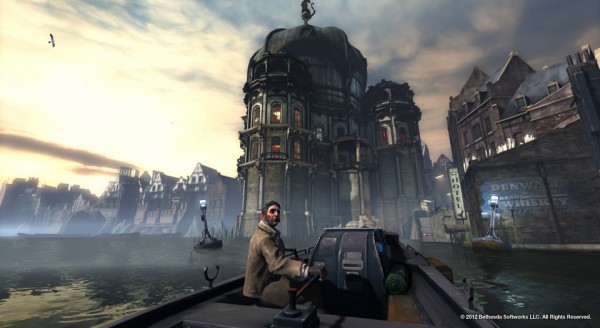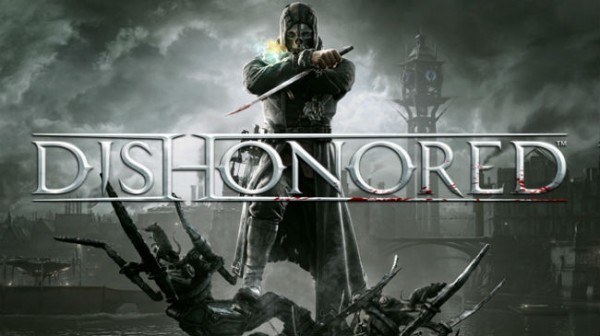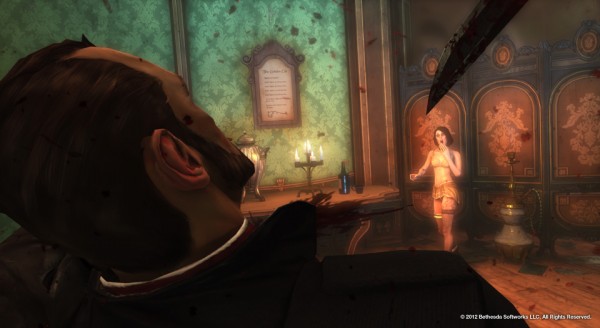Dishonored is a first-person stealth action game developed by Arkane Studios for the PC, Playstation 3 and Xbox 360. If you don’t know that already, you’ve been living under a gaming rock. It’s also my Game of the Year, and I think anyone who disagrees is an awful yazzihamper of an un-person.
I found this year in gaming mind-numbingly dull and hackneyed. Humdrum. So my wife requesting Dishonored for her birthday turned out to be a massive boon. I’d originally intended on avoiding the game because Bethesda belong to the fortunately small division of demipersimmondaines and slatternions who charge 20% more for PC games. That considered, I’ve purchased and achieved platinum status on the game—something I can say I’ve done for very few titles. I would have liked to have a review to link you here, but I never got around to writing one. I loathe writing reviews. So I’m going to try and limn the game’s many sweet spots without drowning you in the verbiage of a Wot-I-Think affair.

Finding a toothsome starting point to sink my teeth into isn’t easy here; chiefly because there are so many stellar ideas at work in Dishonored. I paused after that full stop to scratch a scab on my palm and ruminate. What that inner-fjard thought reaped was an analogy, so let’s begin there. The world of Dishonored is a particularly gnarly wound: a grim setting of crumbling civilization and destroyed lives. And like any good scab, you really want to pick at it and discover what’s beneath. Dishonored does not fail in that respect. The city of Dunwall is alive and suffering great change that affects all of its citizens—from empress to whaler. I cannot stress just how well-realized the setting is. From the coalescence of science fiction and alternate history to the absolutely mesmerizing architecture to the characters and lore therein: it’s all downright astounding. Arkane Studios deserve a pat on their backs for the work put into the world. The Dishonored universe breathes.
The two most prominent complaints I’ve heard regarding Dishonored were that it’s too short and the powers overshadowed the stealth. Well, I don’t think brevity should discredit a video game—especially a game so wanton for multiple playthroughs. I’d rather a brief euphoria than prolonged boredom. Dishonored manages its time well; let’s go with that. Let us. As far as the stealth is concerned, I’m inclined to agree that it could have been implemented better. Still, I don’t think the powers necessarily detracted from either the game or the sneaky mossboots approach. Nay! What the powers did to Dishonored was introduce a different kind of stealth: one about options and action. Some would scoff at an action-oriented stealth game, but I think it’s tickety-boo. The game offered an array of options both in level progression and the fluidity of combat-stealth-combat transition not found in most stealth-heavy affairs. The player is raised above the limits of a measly footpad. I think that describes it best. You’re a force in Dunwall; a clandestine badass, but a badass nonetheless.
Choice and consequence are words often tossed about the industry nowadays. I can’t think of many games that do them right. Whether Dishonored is on that list is debatable, but I will say this: it makes your choices and their consequences interesting. I think that carries more weight than avoiding or adhering to popular morality. As my spoiler-light article on daughters in Dishonored will tell you, the game certainly has a piercing way of addressing those pervasive c-words, choice and consequence.
Not only is Dishonored a new IP, it’s an amazing new IP. I welcome those rare creatures with verve. It’s a visceral, dark, incredibly refreshing and surprisingly thought-provoking experience that I’m fortunate to have played.


